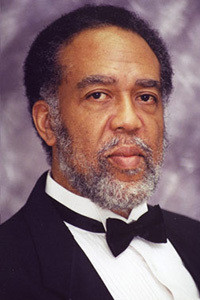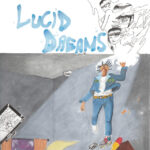 Glenn Burleigh headshot
Glenn Burleigh headshot
“Order My Steps” stands as a powerful and beloved gospel song, deeply resonating within and beyond the Black church tradition. Composed by Glenn Edward Burleigh in 1991, this anthem’s heartfelt plea for divine guidance has propelled it into widespread acclaim, embraced by choirs of all levels and backgrounds. Its enduring popularity is a testament to its profound message and musical richness, solidifying its place as a contemporary gospel classic. This exploration delves into the origins, influences, and lasting impact of “Order My Steps,” a cornerstone of modern gospel music.
The Composer: Glenn Edward Burleigh – A Master of Musical Fusion
Glenn Edward Burleigh (1949–2007), the Oklahoma-born composer behind “Order My Steps,” was a multifaceted musical talent. His expertise spanned composition, piano performance, conducting, and music education. Burleigh’s formal training at the University of Oklahoma and Oklahoma City University laid a foundation for a distinguished career marked by a unique ability to blend diverse musical styles. While celebrated for his gospel compositions, defining Burleigh solely as a gospel composer would be limiting. He was an African American composer who skillfully navigated various genres, drawing inspiration from African American musical idioms to shape his distinctive voice.
Burleigh’s genius lay in his seamless integration of Western classical music traditions with the soulful essence of African American musical expressions like blues, jazz, and gospel. In this innovative approach, he walked in the footsteps of pioneering African American composers such as William Grant Still, Florence Price, Duke Ellington, William Levi Dawson, and R. Nathaniel Dett, all of whom enriched the landscape of American music by weaving together diverse musical threads.
Biblical Roots: Lyrical Depth and Scriptural Inspiration
A hallmark of Burleigh’s choral works, including “Order My Steps,” is their deep connection to biblical texts. He masterfully incorporated biblical allusions and direct scriptural quotations into his lyrics, adding layers of meaning and spiritual resonance. This is evident in another of his notable songs, “Lay Aside Every Weight,” featured in the film The Preacher’s Wife. While not on the official soundtrack, Whitney Houston’s performance of the song alongside the Georgia Mass Choir in the movie brought it significant attention. Gospel icon Dorothy Norwood later recorded it on her album The Lord Is a Wonder. The song’s refrain directly quotes Hebrews 12:1, and further lines draw from Hebrews 12:2 and Ephesians 4:22, 29. Similarly, songs like “Faithful Over a Few Things” (referencing Matthew 25:21) and “If My People” (II Chronicles 7:14) showcase Burleigh’s consistent use of scripture as a lyrical foundation.
“Order My Steps” itself finds its direct inspiration in Psalm 119:133, “Order my steps in your word.” The song unfolds in a classic A-B-C structure. The A section establishes the central theme with three stanzas, leading into the bridge (B section). While hymnal versions often omit the C section, it’s characterized by an extended vamp, a departure from typical gospel vamps, which are usually shorter and more repetitive, designed for soloist improvisation. The lyric “Bridle my tongue, let my words edify” in the third stanza echoes Ephesians 4:29, while the subsequent line draws from Psalm 19:14. The B section subtly nods to the hymn “A Charge to Keep I Have” by Charles Wesley, with lines like “My calling to fulfill” and a paraphrase of “to do my Master’s will” appearing as “I want to walk worthy / My calling to fulfill / Please order my steps, Lord, / And I’ll do your blessed will.”
The Story Behind the Song: Inspiration Strikes in Church
The genesis of “Order My Steps” can be traced back to Burleigh’s time as minister of music at Good Hope Missionary Baptist Church in Houston, Texas. During a service where Burleigh and the Good Hope choir accompanied their pastor to St. Agnus Baptist Church, also in Houston, inspiration sparked. St. Agnus was renowned for its vibrant youth program, particularly its “Drill Team,” a step team derivative. Step teams, prevalent on Historically Black Colleges and Universities (HBCUs) campuses, are a dynamic blend of dance and percussive rhythms created through intricate body movements and choreography. This art form evolved from enslaved Africans in the antebellum South who, denied traditional drums, innovated rhythmic expression using their bodies. Church step teams and liturgical dance ministries often incorporate scripture into their performances, adding a sacred dimension to the art.
The St. Agnus Drill Team’s performance that day, incorporating spoken scripture, deeply moved Glenn Burleigh. Barbara Johnson Tucker, a member of Good Hope, recounts, “Burleigh was sitting at the back [of the church] with a tablet, writing ferociously, steadily writing as the children performed.” Witnessing the Drill Team, the complete vision for “Order My Steps” unfolded in Burleigh’s mind. “Burleigh said, ‘the Lord gave him all of the verses, the whole song,’” Tucker recalled.
Burleigh later introduced a portion of the song to the Good Hope Missionary Baptist Church choir, focusing on the B section beginning with “I want to walk worthy.” Tucker remembers rehearsals where the choir repeated this section for nearly thirty minutes, deeply moved and unable to stop singing. Subsequently, Tucker persuaded Burleigh to feature this segment as the benediction for a choir concert at Good Hope. Ultimately, the choir performed the entire song, creating a powerful and memorable experience for everyone present. Barbara Johnson Tucker, a coloratura soprano, holds the distinction of being the first to sing and record Burleigh’s now-iconic composition.
Rise to Popularity and Recognition: From Workshops to Awards
Following its initial performances, Burleigh shared “Order My Steps” in various church settings and workshops, including the Church Music Workshop at Jackson State University (JSU) in Mississippi, a collaborative event between JSU and the AME Church’s Eighth Episcopal District. Crucially, Burleigh introduced the song to the Gospel Music Workshop of America, Inc. (GMWA), founded by gospel legend Rev. James Cleveland. The GMWA has played a pivotal role in nurturing the careers of numerous gospel music luminaries, including Kurt Carr, John P Kee, and Kirk Franklin.
In 1993, at the GMWA annual convention in Indianapolis, Indiana, Burleigh presented “Order My Steps” to the National Mass Choir for potential recording. While initially not selected by the Mass Choir, the song resonated with the women’s division, who embraced it enthusiastically. The Women of Worship recorded “Order My Steps” at the convention that year. In a serendipitous turn of events, when the designated soloist fell ill, Mimi Redd stepped in at the last minute to record the lead vocals with the Women of Worship. The song’s release in 1994 on the album It’s Our Time was met with widespread acclaim. “Order My Steps” earned the title of Song of the Year at the 1994 Texas Gospel Music Awards. In 1995, it received a Dove Award nomination and impressively charted on Billboard Magazine’s Gospel Music chart for ninety-four consecutive weeks. The song’s reach expanded further when the Grammy-award-winning Brooklyn Tabernacle Choir recorded it for their 1996 album, Favorite Song of All.
Legacy and Impact: “Order My Steps” in Hymnals and Beyond
“Order My Steps” has secured a lasting place in the landscape of gospel music, appearing in numerous African American hymnals published in the twenty-first century and various congregational music collections. Its journey from a moment of inspiration in a Houston church to a globally recognized gospel anthem underscores its profound impact. Glenn Burleigh’s “Order My Steps” continues to inspire and uplift, guiding individuals and communities with its timeless message of faith and divine direction.
SOURCES
Sharon Gratto. “Ethnics and Multicultural Choirs: A Tribute to Composer Glenn E. Burleigh (1947–2007).” The Choral Journal 49, no. 2 (2008), 101–102.
Claudrena Harold. “‘Lord, Let Me Be an Instrument’: The Artistry and Cultural Politics of Reverend James Cleveland and the Gospel Music Workshop of America, 1963–1991.’” Journal of Africana Religions 5, no. 2 (2017), 157–180.
Carrie Allen Tipton. “Glenn Burleigh, Let God Arise: Opus 35, Cantata for Eastertime. The Ambassador’s Concert Choir; Graceway Baptist Church Choir; Glenn Burleigh, conductor. Burleigh Music Inspirations, 1997, 2 CDs.” Journal of the Society for American Music 7, no. 3 (2013), 350–353.
Scripture verses marked BSB are from The Holy Bible, Berean Standard Bible, BSB. Copyright ©2016, 2020 by Bible Hub Used by Permission. All Rights Reserved Worldwide.
M. Roger Holland II is a Teaching Associate Professor in Music and Religion and Director of The Spirituals Project at the Lamont School of Music, University of Denver. He holds degrees from Westminster Choir College, Manhattan School of Music, and Union Theological Seminary (New York). He is a candidate in the Doctor of Pastoral Music program at Perkins School of Theology, Southern Methodist University, where he has studied hymnology with Dr. C. Michael Hawn.

